| Srl | Item |
| 1 |
ID:
064433


|
|
|
| 2 |
ID:
096974
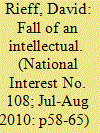

|
|
|
| 3 |
ID:
133447


|
|
|
|
|
| Publication |
2014.
|
| Summary/Abstract |
In the past couple of years we have seen a decline in the influence of United States as a global superpower, particularly in Europe and East Asia. The military exuberance of the US after the collapse of Soviet Union led to a heightened global paranoia against a perceived US imperialism. Thus began a race among several emerging nations to fill the gap of a balancing superpower. Russia fell behind due to its economic problems, as the capitalist 'shock therapy' didn't work as well as American analysts predicted. The European Union also seems to be going nowhere after a series of reorganisations and also lack of unified military. This has brought the focus on two emerging Asian countries - India and China.
|
|
|
|
|
|
|
|
|
|
|
|
|
|
|
|
| 4 |
ID:
192293
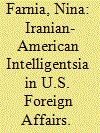

|
|
|
|
|
| Summary/Abstract |
This article challenges the anti-structural and ahistorical turn in recent histories of the Iranian Revolution. Tracing the genealogy of this anti-structural turn to the publication of Foucault’s writings on Iran, the author argues that the continued decline of US-Iran relations, coupled with hostility toward anti-imperialist scholarship in US academia, has created the conditions for an ahistoricism in US-based scholarship on Iran. This turn is further exacerbated by the lack of accessible archives to enable rigorous analyses of the Revolution. The article concludes by distinguishing between an intellectual, one who challenges the status quo to create a more just world, and a functionary, whose scholarly contributions are guided by the precepts of foundation funding and the State Department. Ultimately the article calls for a transformation in Iranian Studies toward radical intellectualism.
|
|
|
|
|
|
|
|
|
|
|
|
|
|
|
|
| 5 |
ID:
133745
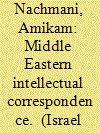

|
|
|
|
|
| Publication |
2014.
|
| Summary/Abstract |
Jacob Talmon and Arnold Toynbee were among the 20 most influential historians of the twentieth century in a list published by the Dutch journal Intermediair in May 1980. But this is not the only common denominator between them: both faced strong opposition at home - Toynbee was ridiculed and Talmon was considered a 'self-hating Jew'. Following the generally accepted definition that an intellectual is one who attempts to shape history while it is still in progress, they both tried to shape developments in the Arab-Israeli conflict and to ameliorate its consequences. They failed, but their insights and suggestions are still valid today. They differed deeply with regard to major aspects of the Middle East conflict, in particular the right of the Jewish people to statehood. Following the 1967 Six Day War, they corresponded and discussed the Middle East conflict. The article focuses on this correspondence and quotes from their private papers, books and articles over the last 70 years, and from other sources. Sadly, not much has changed in the Arab-Israeli conflict. 'That which has been, it is that which shall be; and that which has been done is that which shall be done; and there is nothing new under the sun
|
|
|
|
|
|
|
|
|
|
|
|
|
|
|
|
| 6 |
ID:
178769
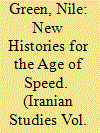

|
|
|
|
|
| Summary/Abstract |
By conceiving two emergent nation-states as a single region linked by conjoining roads, shared technologies and circulating researchers, this essay traces the emergence of a common “intellectual infrastructure” that during the interwar decades enabled European, American, Iranian, Afghan and Indian scholars to promote archeological and architectural interpretations of the Iranian and Afghan past. Taking Robert Byron’s Road to Oxiana as a fixed point of reference, the following pages survey the motor-linked sites where these new disciplinary approaches were developed and disseminated. By positioning Byron amid a larger cadre of investigators publishing in Farsi, Dari and Urdu no less than English, French and German, the essay shows how shifts in Iranian perceptions of the ancient and medieval past were part of a larger regional development, unfolding not only in familiar dialogue with Europe, but also in conversation and to some degree competition with nationalist scholarship in Afghanistan and India. Together with the journals, museums, learned societies and congresses which were launched in the 1920s and 1930s, cars and cameras—those key tools of the “age of speed”—were central to these learned ventures. Far from generating uniformity, this shared intellectual infrastructure enabled multiple interpretations of the archaeological and architectural past that were nonetheless mutually intelligible and methodologically consistent.
|
|
|
|
|
|
|
|
|
|
|
|
|
|
|
|
| 7 |
ID:
142202
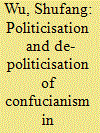

|
|
|